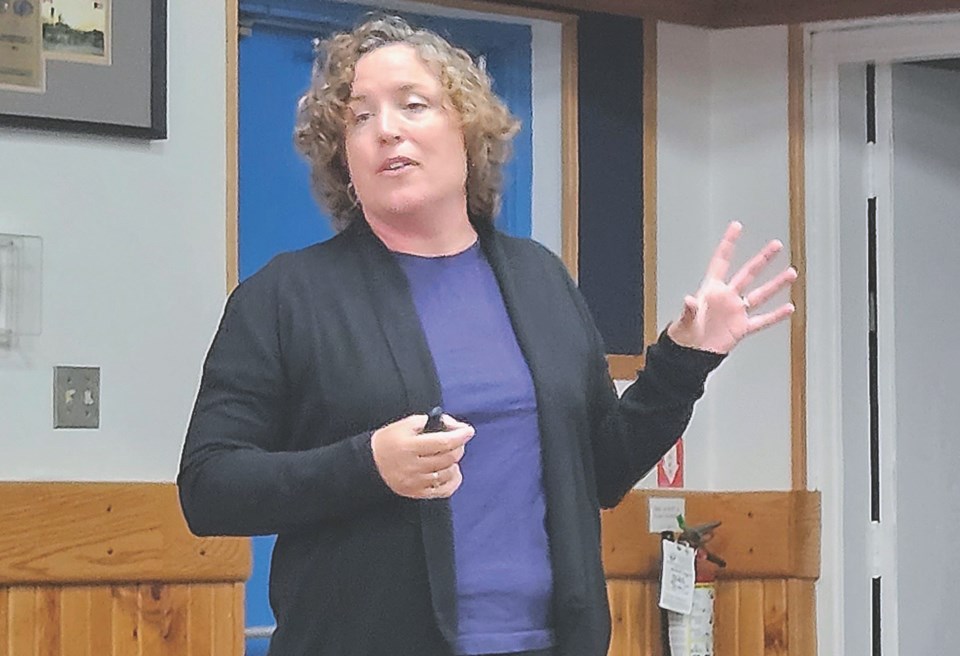WESTLOCK – Westlock County business AltRoot is partnering with the Circular Innovation Council (CIC) on a new green initiative for the region.
In a presentation at the Aug. 22 Westlock and District Chamber of Commerce monthly meeting, AltRoot’s Brian Wonnacott and Colby Hansen were joined by pilot project manager Katie Motta of the CIC and shared some of the details and potential results.
Hansen and Wonnacott met members of the CIC, a non-profit organization from southwestern Ontario at a conference last fall and have now partnered with them to introduce a ‘food waste diversion pilot project’ in the Town of Westlock which will take organic waste from local businesses and divert it from the landfill for compost.
While details are still being finalized, including a launch date, they hope to have it underway later this fall. The pilot will be about six months and will require about 40 to 60 participating businesses between the town and Sherwood Park, who is also participating in the pilot.
“We’re looking forward to creating more jobs and diverting food waste from the landfills, turning that into compost and applying it to farmland,” said Hansen. “What we’re doing is a realistic green initiative … composting is a proven technique. It creates so many new opportunities as far as jobs and streams and we’re very excited to do this in my home community in Westlock.”
CIC received close to $500,000 in grant money from Agriculture and Agri-food Canada for the Circular Food Recovery and Waste Diversion pilot project in Guelph and Wellington County in Ontario and will use a portion of that to introduce the pilot project here.
“We’re going to subsidize that heavily based on the funding we have,” said Motta, noting support from hauling partner Green For Life (GFL) Environmental, that would provide the green bins to businesses and the weekly organics collection. “We support you in terms of determining whether you have some surplus food that might be able to go to local farmers directly or for food rescue in the community. We also provide all the signage and posters to make it easy for you and your staff to do this work so we provide all of those guidelines and training.
“Really, the goal of the pilot project is how can we make it simple and how can we make it affordable for businesses of all types and all sizes to separate out their food scrapes.”
Motta also noted the common collection model, route and economics of the pilot that will provide a wealth of data.
“We want to be able to give you information about how much food waste you’ve diverted. Some of your customers may be interested in knowing that you’re putting effort into these initiatives,” said Motta. “We want to share that data with you so you can share it with your customers or your clients.”
Some of that information collected during the pilot may be done via a sensor in the green bin which may also provide a better way to potentially charge businesses for their food waste.
“Right now if you’ve got a green bin, you’re charged whether it’s totally full of food waste or if it’s only a quarter-full,” explained Motta, pointing out they are looking into ways to charge businesses based on the amount of food waste they actually produce/
“It turns out that with the exception of some of the largest grocery retailers and some of the manufactures, who have volumes that are too large for us, we can serve pretty much every type of business that might have any type of food scraps. So everything from offices all the way through to mid and decent sized grocery retailers and everything in between hospitals and long-term care we currently have in our existing pilot in Guelph and Wellington.”
The presentation also shared some of the local benefits like increased employment opportunities and commercial waste efficiencies, increased agricultural soil productivity and reduced local environmental impacts.
“Collectively, businesses in Westlock can have a real impact,” said Motta.



